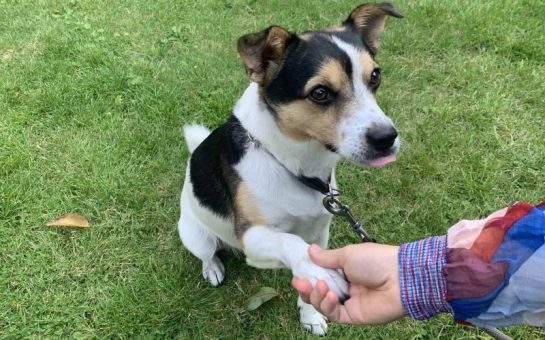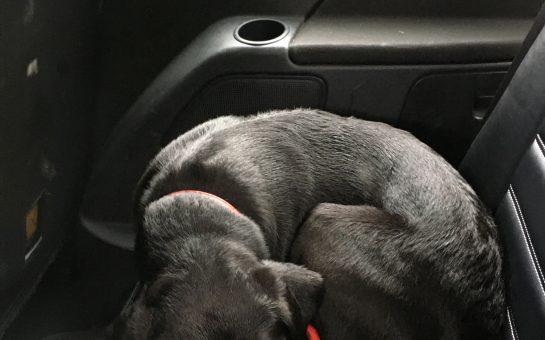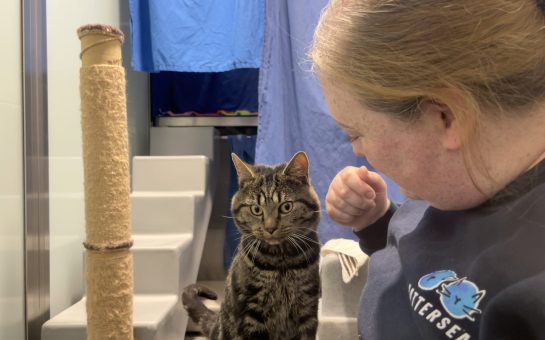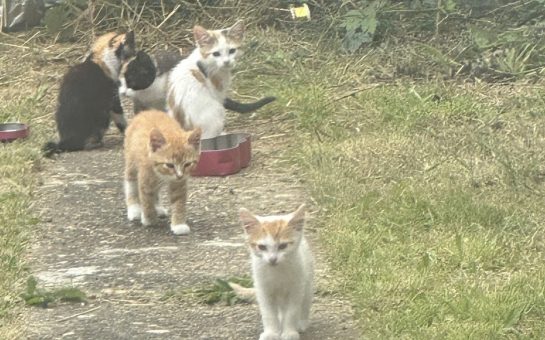Puppy parvovirus cases are surging by Tooting Common with several dogs tragically passing away from the preventable disease.
Canine parvovirus, often referred to simply as parvo, is a highly contagious disease that can be fatal to dogs, with puppies aged six weeks to six months most at risk.
The virus attacks a dog’s intestinal cells so they become weak and dehydrated often showing symptoms of vomit, diarrhoea and even passing blood.
It takes around seven days from contact with the infection for the disease to show these symptoms.
Lee Curry is a south west London resident who often walked his young Vizsla Maya across Tooting Common on his way to pick up his 10-year-old twin sons from school.
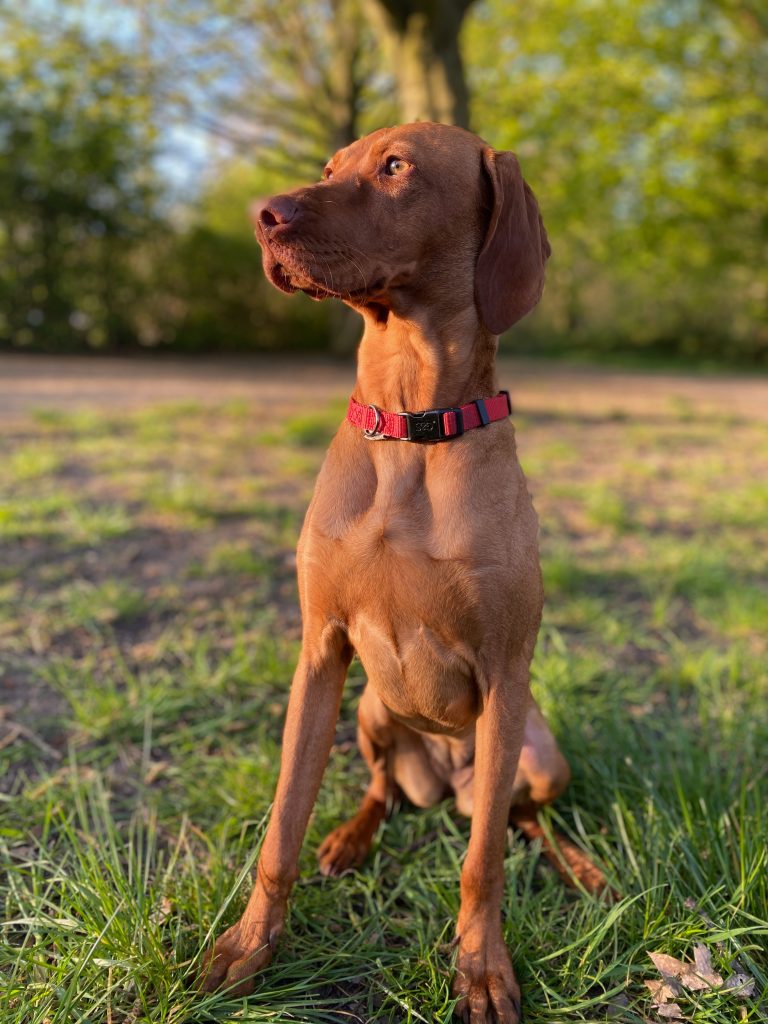
He told SWL: “Maya passed away on her first birthday, so, we only had her for 10 months.
“She was, as the breed is known for, very energetic, very lively. She was full of life.
“Just to see the look on our sons faces and just trying to manage their grief and uncontrollable tears like I have never seen before. I found that really hard. I was just watching them weep and weep.”
Maya had been vaccinated against parvovirus but Lee first noticed she was ill on the Bank Holiday Monday and by the Thursday afternoon, the vets decided they had no option but to put her to sleep.
Parvo is passed through direct contact with an infected dog themselves or an infected dog’s faeces and urine.
While there is no cure for the virus, there is a vaccine which puppies should get at eight and 12 weeks, and annual boosters are now being offered to fully protect pets from the disease.
The virus can survive on exterior surfaces like streets, pavements and grass for up to six months which means even if your dog has received its first jabs, a booster is important to keep them protected.
Streatham Hill Veterinary Surgery told SWL: “The parvo outbreak is noticeable and significant this year.”
They revealed they had seen 20 cases of parvo so far this year which is more than a six-fold increase from just three cases in the whole of the previous year.
Two of those 20 dogs passed away and Dane Walker, Head Vet at Streatham Hill Veterinary Surgery said: “One was put to sleep at the owner’s request. The cost can be an issue and there is no guarantee of results. It is possible to treat the symptoms but not the virus.
“Of the dead dogs, one had not been vaccinated. The other cases had mostly been vaccinated. We have now called for extra vaccination. It is potentially a new strain but there is no evidence of this yet.”
Walker added that it was mostly young puppies under six months catching the virus, but a few older dogs had been admitted.
Owners of these dogs thought they had caught the virus at local Streatham parks and in Wimbledon.
He attributed the increase in parvo cases to the puppy boom over lockdown and potentially uneducated breeders which The Times also alluded to in a recent investigation.
He stressed that lungworm, kennel cough, Alabama rot and grass seed issues in the summer are also serious conditions that local dog owners should be aware of.
Dogs on Tooting Common Facebook group and NextDoor posts about this topic have received lots of comments with owners sharing personal experiences and warnings about parvovirus risks on the common.
Caroline Reay, head of veterinary services at Blue Cross, told SWL: “I think there’s a number of factors at work here because obviously vet services have been disrupted by lockdown and so getting vaccinations done hasn’t always been easy. Although, vets have been prioritising unvaccinated animals.
“And, of course, the other thing is that if there is a high demand for puppies, then they will tend to come from more devious sources, for example illegal imports. I mean because there’s a lot of pressure, the price of puppies has gone up quite a lot during the coronavirus epidemic.
“And, of course, that means there’s an incentive for the unscrupulous to make money and just treat the animals as objects rather than treating them as animals.”
She added signs to look out for as parvovirus and gastroenteritis can have similar symptoms.
She said: “If your puppy or your dog has got vomiting and diarrhoea, in a puppy, I would say if it’s more than a few hours’ duration, and particularly if the puppy seems unwell or very poorly in itself, then I would contact your vet for advice, but obviously, as with human babies, one always worries more about any symptom in a young animal than you do in an older animal.
“So, for puppies I would probably spend a few hours monitoring them and within a few hours if they’re vomiting a few times or they’ve got diarrhoea and a few episodes of diarrhoea, then I would say contact your vet.
“In an older dog you can afford to usually afford to wait sort of up to 24 hours, provided the animal seems bright in itself. But if you’re worried, then you should contact your vet.
“And I think with regard to getting puppies, then you should try and get from a reputable source and what that would involve is seeing the puppy with its mother at the breeder’s house and being fairly shrewd about looking to see if there are lots of other animals there, and trying to be selective with your contact.
“If for example you’re contacting somebody over the internet and six or seven other outlets with the same phone number then I probably wouldn’t contact them.”
The Where’s Mum Campaign from Pup’s Aid and Lucy’s Law both build on this advice to promote buying puppies from honourable breeders and banning puppy farms in the UK.
Other veterinary services across the country are also seeing a similar concerning pattern and My Family Vets, the UK’s biggest group of vet practices, is calling on pet owners to attend annual vaccination appointments as figures show that up to 45% of registered pet owners haven’t received their initial vaccination course or subsequent boosters.
Edward Davies, Chairman of the UK Clinical Board at My Family Vets said: “There are several reasons why we are really concerned about seeing an increase in cases of parvovirus and our practices have been taking steps to brace themselves for a potential resurgence in this disease as well as ensuring they are encouraging their clients to keep up to date with dog vaccinations.
“Due to the lockdown puppy boom and the whole Covid situation, ensuring preventative health care has been correctly followed for all pets has been a real challenge. The potential resurgence of parvo has been quite a worry during this time.
“Luckily, dogs and puppies can receive a vaccine against parvovirus. Puppies can get their first vaccination when they are six to eight weeks old, with a follow-up injection two to four weeks later.
“Your dog’s annual health check and vaccination cycle includes protection against parvovirus, so it’s vital to keep these up to protect your pet against this serious infection.
“As well as protecting your adult dog or young puppy against this nasty and potentially fatal disease, regular vaccination is required by kennels and pet insurers as a condition of cover.
“I cannot stress enough just how important it is for pet owners to get their pets vaccinated and we can hopefully prevent this becoming a problem for pet owners across the UK this year.”
Anyone affected by this story can check the latest parvo advice from the Blue Cross here.
